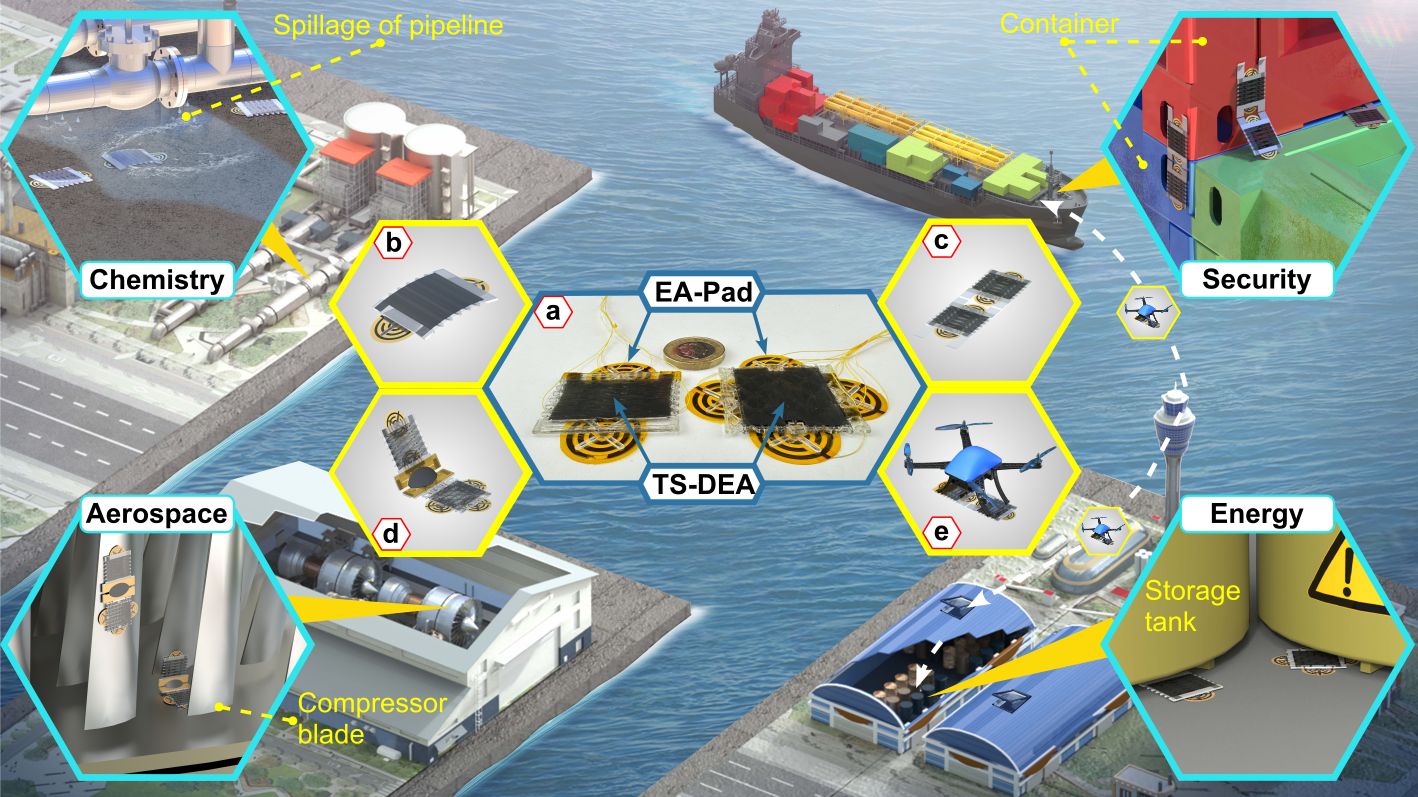Wednesday, 11 September 2024
Researchers at Rolls-Royce University Technology Centre (UTC) in Manufacturing and On-Wing Technology at the University of Nottingham have developed ultra-thin soft robots, designed for exploring narrow spaces in challenging built environments.
These advanced robots, featuring multimodal locomotion capabilities, are set to transform the way industries, such as power plants, bridges and aero engines, conduct inspections and maintenance.
The innovative robots, known as Thin Soft Robots (TS-Robots), boast a thin thickness of just 1.7mm, enabling them to access and navigate in confined spaces, such as millimetre-wide gaps beneath doors or within complex machinery.
TS-Robots are equipped with a unique sandwich structure driven by dielectric elastomers, allowing them to crawl, climb, swim, and transition between solid and liquid domains. This adaptability makes them ideal for complex environments that include multiple obstacles across various terrains.
Dr Xin Dong, the project's principal investigator, who initialised the idea, said: "Our TS-Robots are designed to tackle the scientific challenges of multimodal locomotion in soft robotics, particularly when encountering obstacles such as narrow gaps, trenches, walls, and liquids along their navigation paths.
"Unlike conventional robots, which face significant limitations in these environments, our technology offers a potential breakthrough for exploring difficult and complex terrains."
 The Thin Soft Robots can be used in a variety of circumstances and industries.
The Thin Soft Robots can be used in a variety of circumstances and industries.
Notably, the Thin Soft Robots exhibit outstanding performance in terms of output force and speed, achieving forces up to 41 times their weight and speeds of 1.16 times their body length per second.
This exceptional capability enables them to collaborate with multiple TS-Robots or even with other robots, such as drones, enhancing their functionality in tasks such as inspecting challenging environments or delivering goods.
Preliminary tests have already demonstrated the potential of the Thin Soft Robots in real-world applications, including the inspection of electrical generators of advanced hybrid-electric power systems. In this application, the robots successfully navigated the narrow air gap between the rotor and stator of a generator, a feat that traditional tools and robots cannot achieve.
Starting from a 'crazy' idea conceived three years ago, I’m glad that we have not only proven a fully new concept of soft robots but also successfully found their use in real life."
Professor Dragos Axinte, Director at the Rolls-Royce UTC in Manufacturing and On-Wing Technology, added: "The next generation of clean power systems presents new challenges for their inspection and maintenance. We are delighted to see these thin soft robots bringing the possibility to address these challenges and contribute to the future of net-zero."
With these promising results, the research team plans to further optimize the robots’ design and explore new applications in sectors such as aerospace and energy maintenance and nuclear decommissioning.
The full research paper can be accessed in Nature Communications.
Story credits
More information is available from Faith Pring in the Press Office on faith.pring@nottingham.ac.uk
Faith Pring - Media Relations Manager
Email: faith.pring@nottingham.ac.uk
Phone: 0115 748 4411
Location: University of Nottingham, University Park
Notes to editors:
About the University of Nottingham
Ranked 97 in the world and 17th in the UK by the QS World University Rankings, the University of Nottingham is a founding member of Russell Group of research-intensive universities. Studying at the University of Nottingham is a life-changing experience, and we pride ourselves on unlocking the potential of our students. We have a pioneering spirit, expressed in the vision of our founder Sir Jesse Boot, which has seen us lead the way in establishing campuses in China and Malaysia - part of a globally connected network of education, research and industrial engagement.
Nottingham was crowned Sports University of the Year by The Times and Sunday Times Good University Guide 2024 – the third time it has been given the honour since 2018 – and by the Daily Mail University Guide 2024.
The university is among the best universities in the UK for the strength of our research, positioned seventh for research power in the UK according to REF 2021. The birthplace of discoveries such as MRI and ibuprofen, our innovations transform lives and tackle global problems such as sustainable food supplies, ending modern slavery, developing greener transport, and reducing reliance on fossil fuels.
The university is a major employer and industry partner - locally and globally - and our graduates are the third most targeted by the UK's top employers, according to The Graduate Market in 2024 report by High Fliers Research.
We lead the Universities for Nottingham initiative, in partnership with Nottingham Trent University, a pioneering collaboration between the city’s two world-class institutions to improve levels of prosperity, opportunity, sustainability, health and wellbeing for residents in the city and region we are proud to call home.
More news…